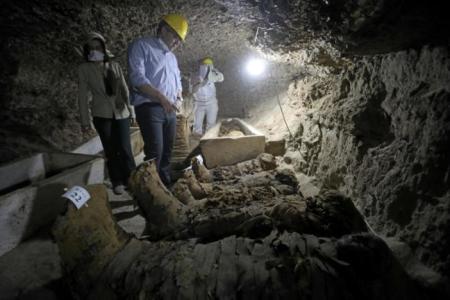DNA Discovery of Ancient Mummies Supports Biblical Narrative of Descendants of Ham, Son of Noah

The biblical narrative that the first Egyptian Dynasty descended from the biblical Ham, the son of Noah, as told in the book of Genesis, could well be supported by recent research based on DNA taken from Egyptian mummies, analysts said.
According to CNN, researchers from the University of Tuebingen and the Max Planck Institute for the Science of Human History in Jena, both in Germany, found "unexpected results" when decoding the genome of ancient Egyptians.
Their work, published online in Nature Communications, concluded that preserved remains found in Abusir-el Meleq, Middle Egypt, were the closest genetic relatives of Neolithic and Bronze Age populations from the Near East, Anatolia and Eastern Mediterranean Europeans.
"We found the ancient Egyptian samples falling distinct from modern Egyptians, and closer towards Near Eastern and European samples," the researchers noted. "In contrast, modern Egyptians are shifted towards sub-Saharan African populations."
What this means, according to commentary in Breaking Israel News, is that the latest scientific findings correlate with biblical accounts, such as Genesis 10:5-6, which states:
"Of these were the isles of the nations divided in their lands, every one after his tongue, after their families, in their nations. And the sons of Ham: Cush, and Mizraim (or Egypt according to the New International Version of the Bible), and Put, and Canaan."
Adam Eliyahu Berkowitz of BIN said: "According to the Bible, Mizraim settled in Egypt whereas Cush settled in Africa, establishing two distinct and separate nations that did not share a common heritage. The scientific theory implies the origins of Africa and Egypt were the same."
The research is based on 166 samples from 151 mummified individuals in Abusir el-Meleq dating back 1,300 years of Egyptian history, from about 1388 BCE to 426 CE.
Using DNA capture techniques, the researchers "successfully obtained complete human mitochondrial genomes from 90 samples and genome-wide SNP data from three male individuals passing quality control."
Professor Johannes Krause of the Max Planck Institute explained that previous DNA analysis of mummies has been treated with skepticism.
"When you touch a bone, you probably leave more DNA on the bone than is inside [it]," Krause said. "Contamination is a big issue. ... Only in the last five or six years has it become possible to actually study DNA from ancient humans, because we can now show whether DNA is ancient or not by [its] chemical properties."
He added that he expects there "will be a ton of ancient Egyptian mummy genomes [mapped] in the next couple of years," with the research just beginning.
As BNI pointed out, the new findings coincide with the Dynastic Race Theory by archaeologist David Rohl, who believed that ancient Egyptians arrived over sea from Mesopotamia, conquered the Nile Valley, and established the first Egyptian dynasties.
Rohl's theory was based on the biblical account of Ham, who moved with his people from Mesopotamia to settle in Egypt after the Great Flood.
Rohl led an expedition in 1988 into Wadi Hammamat, a dry river bed in Egypt's Eastern Desert, which studied ancient wall drawings depicting longs boats with as many as 70 oarsmen.
The drawings are said to have conformed to the archaeologist's theory of an influx of Mesopotamian elite who arrived in Egypt by sailing around the coastline of the Arabian Peninsula into the Red Sea.






















